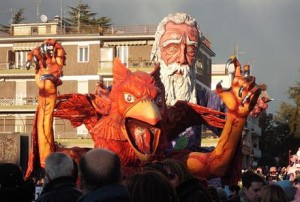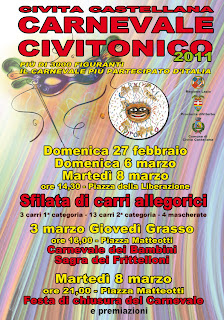
Carnevale, from the latin for ‘putting away meat’, denotes the festive season running up to the beginning of lent on Ash Wednesday. It’s celebrated all over Italy (and the world) and is a great time to party as the locals really let their hair down and have fun. The most famous carnivals in Italy are those held in Venice, Viareggio, Ivrea and Acireale. However, everywhere in Italy celebrates in some way, so there's no need to change your plans if you're not near one of these towns and cities.
In Rome, Carnevale gained popularity in the 17th century. Until the 1880's Carnevale was celebrated with a riderless horse race down the Via del Corso. However, after a series of accidents Rome’s festivities were stopped, being deemed a danger to the public (and yet people still drive in Rome...). Recently, thankfully, Rome has been celebrating Carnevale once again! Having said that, if you want to escape the hustle and bustle of Rome, and perhaps experience a more 'authentic' carnevale, there are loads of carnival celebrations going on in pretty much every town and village in Lazio. I’ll mention the few I've heard of, but click here for a list of some of the others in Tuscia (which is essentially the province of Viterbo).
All Carnival celebrations include some kind of procession, with allegoric floats, usually based on news or TV events , shows etc., along with carnival sweets such as frappe, scroccafusi and ravioli, usually all deep fried in pork fat (it is meant to be a feast before Lent afterall!) Most parades are on the two Sundays before Lent (i.e starting this Sunday) and there is often a ‘Carnevale dei Bambini’ on the Thursday before (i.e. the 3rd of March this year), with processions from various schools and youth groups, before the final events on Martedi` Grasso (Fat Tuesday, or Shrove Tuesday, if you like). At the end of the carnevale, the carnival king (or puccio in civitonico, which means puppet) is burnt. This isn't as barbaric as it sounds, as the carnival king is simply a big mascot, usually resembling someone important or comical that they want to poke mild fun at (e.g. there may be lots of Berlusconi-like kings around this year). The burning of the carnival king marks the death of carnival and the beginning of Lent (so out go the moreish frappe, crepes etc....)
My picks for Carnevale in Lazio:
Carnevale Civitonico – Civita Castellana
 Carnevale Civitonico is a massive carnival that engulfs the town of Civita Castellana for a few days. Over 3000 people get involved (making it one of the biggest in Lazio) with masked parades and celebrations and the whole town comes out for a big party. This year, Carnevale Civitonico starts on Sunday 27th February and ends on Martedi Grasso, the 8th of March. A band called ‘La Rustica’, who formed way back in 1956, are opening the parade on Sunday 27th Feb by playing music through instruments made out of everyday objects. The poster, containing the full programme, can be found here. On the 3rd of March there is a ‘carnevale dei bambini', with a traditional Sagra dei Frittelloni (Pancake festival!), where you can get a pancake (well, they are more like crepes than pancakes, for those that can tell the difference), covered with sugar or, more traditionally (and weirdly, if you ask me) with plenty of pecorino cheese (made from sheeps milk). It's a great day out for all the family and I'm gutted I'm going to be missing it this year.
Carnevale Civitonico is a massive carnival that engulfs the town of Civita Castellana for a few days. Over 3000 people get involved (making it one of the biggest in Lazio) with masked parades and celebrations and the whole town comes out for a big party. This year, Carnevale Civitonico starts on Sunday 27th February and ends on Martedi Grasso, the 8th of March. A band called ‘La Rustica’, who formed way back in 1956, are opening the parade on Sunday 27th Feb by playing music through instruments made out of everyday objects. The poster, containing the full programme, can be found here. On the 3rd of March there is a ‘carnevale dei bambini', with a traditional Sagra dei Frittelloni (Pancake festival!), where you can get a pancake (well, they are more like crepes than pancakes, for those that can tell the difference), covered with sugar or, more traditionally (and weirdly, if you ask me) with plenty of pecorino cheese (made from sheeps milk). It's a great day out for all the family and I'm gutted I'm going to be missing it this year.
Carnevale Ronciglione
 |
| The riderless horse race (from www.ronciglione.org) |
Wherever you go, every town and village will have something on for carnival, so get out there and get involved. The main thing about Carnevale is to have fun, after all a Carnevale ogni scherzo vale!*
*Anything goes at carnival!

